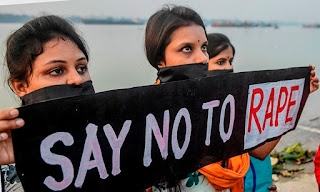10 ways you can stand against rape culture
Rape culture is pervasive. It’s embedded in the way we think, speak, and move in the world. While the contexts may differ, rape culture is always rooted in patriarchal beliefs, power,& control...!
|Courtesy by unwomen.org| |Edited by Ramzan Awan|
Rape culture is the social environment that allows sexual violence to be normalized and justified, fueled by the persistent gender inequalities and attitudes about gender and sexuality.Naming it is the first step to dismantling rape culture...!
Every day we have the opportunity to examine our behaviours and beliefs for biases that permit rape culture to continue. From the attitudes we have about gender identities to the policies we support in our communities, we can all take action to stand against rape culture...!
Here are 10 ways you can do your part:
#1.Create a culture of Enthusiastic consent.
Freely given consent is mandatory, every time. Rather than listening for a “no,” make sure there is an active, “yes,” from all involved. Adopt enthusiastic consent in your life and talk about it..!
#2.Speak out against the root causes.
Rape culture is allowed to continue when we buy into ideas of masculinity that see violence and dominance as “strong” and “male”, and when women and girls are less valued..!
It is also underpinned by victim-blaming—an attitude that suggests a victim rather than the perpetrator bears responsibility for an assault..!
When discussing cases of sexual violence, a victim’s sobriety, clothes, and sexuality are irrelevant. Instead, counter the idea that men and boys must obtain power through violence and question the notion of sex as an entitlement..!
#3.Redefine masculinity.
Take a critical look at what masculinity means to you and how you embody it. Self-reflection, community conversations, and artistic expression are just some of the tools available for men and boys (as well as women and girls) to examine and redefine masculinities with feminist principles..!
#4.Stop victim-blaming.
Because language is deeply embedded in culture, we may forget that the words and phrases we use each day shape our reality..!
Rape-affirming beliefs are embedded in our language: “She was dressed like a slut. She was asking for it.!
It is part of popular song lyrics: “I know you want it..!
It is normalized by objectifying women and calling them names in pop culture and media.
You have the power to choose to leave behind language and lyrics that blame victims, objectify women and excuse sexual harassment. What a woman is wearing, what and how much she had to drink, and where she was at a certain time, is not an invitation to rape her..!
#5.Have zero tolerance.
Establish policies of zero tolerance for sexual harassment and violence in the spaces in which you live, work, and play. Leaders must be particularly clear that they are committed to upholding a zero-tolerance policy and that it must be practised every day..!
As a starting point, take a look at what you can do to make harassment at work history..!
#6.Broaden your understanding of rape culture.
Across time and contexts, rape culture takes many forms. It’s important to recognize that rape culture goes beyond the narrow notion of a man assaulting a woman as she walks alone at night..!
For instance, rape culture encompasses a wide array of harmful practices that rob women and girls of their autonomy and rights, such as child marriage and female genital mutilation..!
Know the factors that underpin rape culture and the myths that surround it..!
While no one may disagree that rape is wrong, through words, actions and inaction, sexual violence and sexual harassment is normalized and trivialized, leading us down a slippery slope of rape culture..!
#7.Take an intersectional approach.
Rape culture affects us all, regardless of gender identity, sexuality, economic status, race, religion or age. Rooting it out means leaving behind restrictive definitions of gender and sexuality that limit a person’s right to define and express themselves..!
Certain characteristics such as sexual orientation, disability status or ethnicity, and some contextual factors, increase women’s vulnerability to violence. LGBTQI individuals may be subject to “corrective rape” in which the perpetrator intends to force the victim to conform with sexual and gender stereotypes. During humanitarian crisis, prevalent discrimination against women and girls often exacerbates sexual violence..!
Gulzada Serzhan, is an active member of Feminita, a Kazakhstan feminist initiative that protects and defends the rights of LGBTQI community members. While working as an IT project manager, a male co-worker began to sexually harass her on business trips. When she told him she was a lesbian, his harassment became stronger..!
“He believed he could ‘correct’ me,” Serzhan says. “He said that I needed a strong man...In Kazakhstan, the society accepts and values men who are savage and brutal. It’s considered natural when men make sexual advances towards women..!
If you are invisible in everyday life, your needs will not be thought of, let alone addressed, in a crisis situation, explains Matcha Phorn-in, who works to address the unique needs of LGBTIA individuals in crises...!
#8.Know the history of rape culture.
Rape has been used as a weapon of war and oppression throughout history. It has been used to degrade women and their communities and for ethnic cleansing and genocide...!
There are no quick reads for this. You can start by learning about the use of sexual violence during past and recent conflicts, such as in the Democratic Republic of Congo, the Guatemalan civil war, or the Kosovo conflict..!
#9.invest in women.
Donate to organizations that empower women, amplify their voices, support survivors, and promote acceptance of all gender identities and sexualities...!
#10.Listen to survivors.
In the era of #MeToo, #TimesUp, #NiUnaMenos, #BalanceTonPorc, and other online movements, survivors of violence are speaking out more than ever before...!
Listen to their experiences, read stories of survivors and activists around the globe, and follow #OrangeTheWorld and #GenerationEquality on social media...!
Don’t say, “Why didn’t she leave?”
Do say: “We hear you. We see you. We believe you....!"






